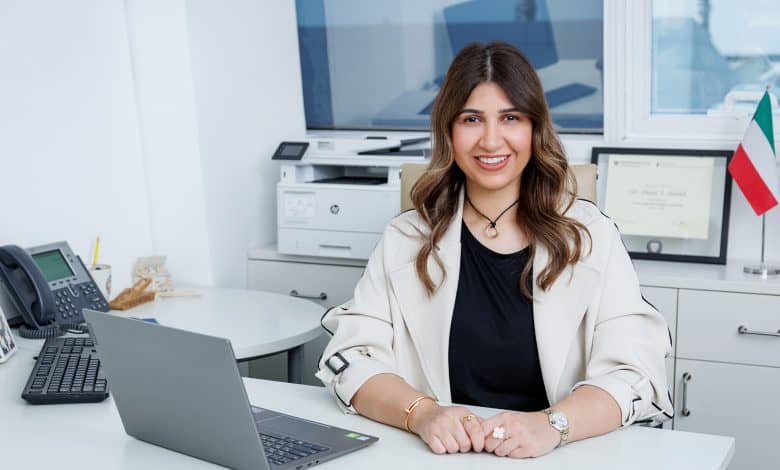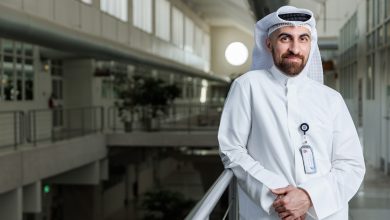Breaking Boundaries
Dhoha Al-Saleh’s Journey Towards Seamless Integration of Diverse Fields to Create Leading research

في عالم يحتفي بالابتكار، ويُقدِّر المقاربات البحثية البينية (متعددةَ التخصصات) Interdisciplinary ، يقود باحثون مثل ضُحى الصالح – الأستاذ المشارك لإدارة الأعمال والتسويق، من جامعة الخليج للعلوم والتكنولوجيا (GUST) – مهمةَ الدمج بين عوالم التكنولوجيا والفن والعلوم. وبفضل خلفيتها الأكاديمية الغنية، التي تضم علومَ الحاسوب والتسويق، تُجسد رحلة ضُحى التكاملَ السلس بين المجالات المتنوعة لإنشاء أبحاثٍ رائدة.
حصلت ضُحى على درجة البكالوريوس في علوم الحاسوب من جامعة الكويت، وتخصُّص مساند في التسويق، وقد زودَها المسارُ الأكاديمي بمزيج من البراعة التحليلية والتفكير الإبداعي. «من ناحيةٍ ساعدني مجالُ علوم الحاسوب على تعزيز مهاراتي في حل المشكلات والتفكير النقدي، ومن ناحية أخرى أدى مجال التسويق إلى تعزيز مستوى الإبداع لديَّ، وساعدني على فَهم الجوانب السيكولوجية للناس بنحو أفضل»، كما قالت تعليقًا على رحلتها التعليمية. وتابعتْ ضُحى قائلة: «لقد استمتعتُ دائمًا بالجوانب الملهِمة للجمع بين الفن والعلم. وقد استفدتُ من مزج العلوم الحاسوبية بالتسويق في دراستي الجامعية استفادةً جمة، إذ سمحت لي الخبرة بالانتقال بسهولة بين الأدوارِ والصناعات المختلفة».
Furthering her academic pursuits, Dhoha pursued postgraduate studies in the United States, earning a master’s degree in business administration from Southern Illinois University – Carbondale, followed by a PhD in Business Administration-Marketing from the same institution. Her thirst for knowledge didn’t stop there; she also attended “Crisis Leadership in Higher Education Program” at Harvard University, and received a Summer Research Fellowship at the University of Missouri - St. Louis.
Dhoha’s primary focus lies within artificial intelligence, specifically exploring its applications in Consumer Behavior, Innovation, and Technology. She finds great fulfillment in collaborating on research endeavors. Her particular interest in cross-cultural investigations in digital marketing and social media, earned her a notable achievement in 2020: she became the first Kuwaiti female member of The Arab-German Young Academy of Sciences and Humanities (AGYA) based in Berlin, Germany, which serves as a platform for fostering interdisciplinary and intercultural research collaborations between Germany and the Arab region. Al-Saleh’s recent work sheds light on the adoption of AI-powered technology from the customer’s perspective, unraveling the intricacies of consumer behavior in the face of technological advancement.
In a conversation with Dhoha, she elaborates on the motivation behind her research, stating, “AI is everywhere right now. It is used in a wide range of applications, from our personal assistants like Alexa and Siri, to cars, factories, education, and healthcare.” It’s imperative to understand what drives individuals in their adoption of AI technology. Given the growth of AI-enabled technology in consumer devices, researchers and firms need to understand consumer behavior in accepting new technology. Firms that are considering implementing AI to provide services for their consumers may want to understand consumer behavior. It can help them determine whether consumers will choose to adopt the technology. “My current research questions the reason that makes consumers choose to adopt AI technology,” she explained.
Dhoha’s research employs a unique methodology, conducting comparative studies between Kuwait and the United States to gauge cultural influences on AI adoption. Utilizing structural equation modeling (SEM), her study delves into the intricacies of consumer behavior and sheds light on the factors influencing AI adoption.
Key findings from Dhoha’s research highlight the positive correlation between motivation, perception, attitude, and intention in AI adoption. Moreover, the study underscores the significance of social and cultural factors, particularly in collectivist societies like Kuwait, where reference groups and family members wield considerable influence.
Research into the adoption of AI draws upon established models such as the Technology Acceptance Model (TAM), Theory of Reasoned Action (TRA), and Unified Theory of Acceptance and Use of Technology (UTAUT). However, Dhoha’s findings revealed limitations within the TAM, which only considers two factors influencing consumer behavior towards technology adoption. Neglecting factors like social and cultural influences undermines the model’s predictive accuracy. “Our study suggests that integrating external cultural and social factors into models like TAM can enhance our understanding of consumer technology adoption”, she said.
Al-Saleh’s research project, funded by KFAS, delves into consumer behavior, and extends existing studies on technology acceptance, revealing the significant impact of social and cultural factors on consumer decisions. Highlighting specific findings, she discusses how the outcomes resonate with Hofstede’s individualism/collectivism dimension, illustrating that individualistic cultures like the U.S. prioritize personal achievement, while collectivistic cultures such as Kuwait emphasize loyalty to the extended family and societal harmony. This dichotomy underscores how individualistic societies prioritize personal needs over group interests, whereas collectivistic societies prioritize the group’s welfare, often requiring conformity and loyalty in exchange for social protection.
From a consumer perspective, Dhoha’s research urges caution regarding the potential alienation and addiction stemming from AI adoption. While AI promises enhanced convenience and efficiency, it also poses ethical concerns and challenges related to misinformation and consumer addiction.
For firms, Dhoha’s findings offer invaluable insights into consumer preferences and decision-making processes when incorporating AI services. By understanding the psychological and social factors driving AI adoption, firms can tailor their strategies to enhance the consumer experience and ensure responsible
AI implementation.
Looking ahead, Dhoha emphasizes the imperative for further quantitative research to enhance our comprehension of AI adoption. By broadening studies to encompass diverse cultural settings and integrating additional variables, researchers can enhance the current knowledge base and facilitate responsible AI integration.
Continuing her journey, Dhoha remains dedicated to advancing scientific research in Kuwait and globally contributing to knowledge. Through collaborative efforts and innovative approaches, she envisions a future where technology acts as a driver for positive transformation, enriching lives and forging a sustainable path for future generations.
بقلم: ماجد المنيفي Majed Al Munefi




